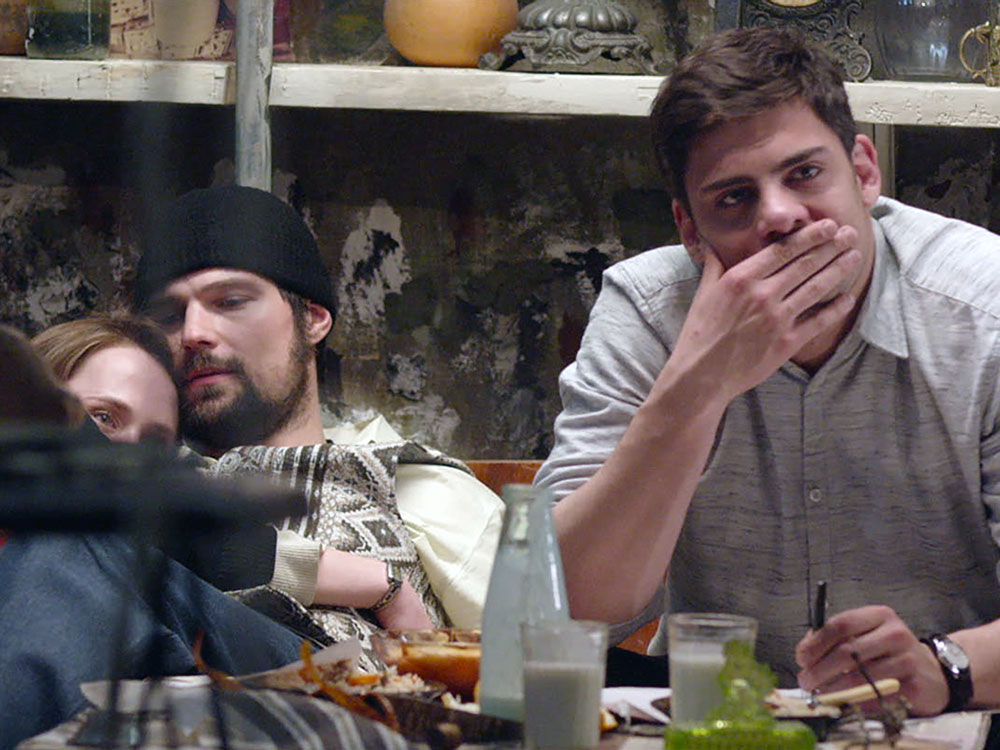Doomed Love (Amor de Perdição), dir. Manoel de Oliveira, Portugal 1979, Portuguese with English subtitles, 261 min
Doomed Love, the third part of Manoel de Oliveira’s Tetralogy of Frustrated Love, is an adaptation of a novel by Camilo Castelo Branco (1825–1890), a Portuguese writer from the Romantic period. The story centres on the tragic love between Simão Botelho and Teresa de Albuquerque, two young people from rival noble families in 19th-century Portugal. Despite their deep love for each other, they are kept apart by their families and social conventions.
Although Oliveira, in a certain sense, remains faithful to the plot, his staging is deliberately stylized and artificial, conceived as a sequence of ‘living images’ filmed in static shots in long takes, and largely within studio settings. More than simply telling a story, for Oliveira the film is about how stories are told in cinema, and how the cross-pollination of narrative structures from literature and film comes to life. In this sense, Doomed Love is a visualization of the endless possibilities of adaptation, a constant back-and-forth between the shores of literature and cinema. Through the juxtaposition of mise-en-scène and an off-screen narrator whose voice does not always align with what is shown on screen, this inextricable thicket of narrative layers generates a play between what is imagined and what is actually seen.
The discovery of Doomed Love was something of a small shock for the critics at Cahiers du Cinéma at the time, a true revelation. ‘Few films, in the history of cinema,’ Serge Daney wrote in his 1979 critique for Cahiers, ‘have pushed the examination of the relationship between what is presented and what is seen so far.’ In its distance from the original novel and its rejection of an impossible historical visualization of the story, it is above all the duration that gives the film its form. ‘Doomed Love is the rare film that takes duration as its very subject. Like every great film, it is simultaneously, as Rivette once said of Rossellini, very slow and incredibly fast. One searches in vain for the slightest connective tissue in this film where the text’s unfolding is of a pair with a constant reinvention of space. Of filmic space.’
‘Dear Serge Daney, you continue to be memory and presence in time and beyond it, you continue to be a complementary part of cinema. And cinema is as much what was projected as what is projected and will be projected on the screens of movie theatres. As we have spoken and speak of these projections, or have written and will write about them, what has been thought, what is being thought, and what will come to be thought. In a word, cinema has not been, and has not even begun. Cinema is. It is because it already was, and it was because it held within itself the spirit of things, and thus, as it has always been, it will always be. And you, Serge Daney, since you have been, it is because you already were and you will always be with us.’ – Manoel de Oliveira, ‘Cher Serge Daney,’ Trafic no. 37, pp. 87–89.
This screening will be introduced by Ricardo Matos Cabo.
This screening will be on 35mm.
Although Oliveira, in a certain sense, remains faithful to the plot, his staging is deliberately stylized and artificial, conceived as a sequence of ‘living images’ filmed in static shots in long takes, and largely within studio settings. More than simply telling a story, for Oliveira the film is about how stories are told in cinema, and how the cross-pollination of narrative structures from literature and film comes to life. In this sense, Doomed Love is a visualization of the endless possibilities of adaptation, a constant back-and-forth between the shores of literature and cinema. Through the juxtaposition of mise-en-scène and an off-screen narrator whose voice does not always align with what is shown on screen, this inextricable thicket of narrative layers generates a play between what is imagined and what is actually seen.
The discovery of Doomed Love was something of a small shock for the critics at Cahiers du Cinéma at the time, a true revelation. ‘Few films, in the history of cinema,’ Serge Daney wrote in his 1979 critique for Cahiers, ‘have pushed the examination of the relationship between what is presented and what is seen so far.’ In its distance from the original novel and its rejection of an impossible historical visualization of the story, it is above all the duration that gives the film its form. ‘Doomed Love is the rare film that takes duration as its very subject. Like every great film, it is simultaneously, as Rivette once said of Rossellini, very slow and incredibly fast. One searches in vain for the slightest connective tissue in this film where the text’s unfolding is of a pair with a constant reinvention of space. Of filmic space.’
‘Dear Serge Daney, you continue to be memory and presence in time and beyond it, you continue to be a complementary part of cinema. And cinema is as much what was projected as what is projected and will be projected on the screens of movie theatres. As we have spoken and speak of these projections, or have written and will write about them, what has been thought, what is being thought, and what will come to be thought. In a word, cinema has not been, and has not even begun. Cinema is. It is because it already was, and it was because it held within itself the spirit of things, and thus, as it has always been, it will always be. And you, Serge Daney, since you have been, it is because you already were and you will always be with us.’ – Manoel de Oliveira, ‘Cher Serge Daney,’ Trafic no. 37, pp. 87–89.
This screening will be introduced by Ricardo Matos Cabo.
This screening will be on 35mm.
02:00 pm
Sat, 06 Sep 2025
Cinema 1
Ticket information
- All tickets that do not require ID (full price, disabled, income support) can be printed at home or stored in email
- For aged-based concession tickets (under 25, student) please bring relevant ID to collect at the front desk before the event.
Access information
Cinema 1
- Both our Cinemas have step free access from The Mall and are accessible by ramp
- We have 1 wheelchair allocated space with a seat for a companion
- All seats are hard back, have a crushed velvet feel and they do not recline
- These are our seat size dimensions: W 42 x D 45 x H 52
- Arm rest either side of the seat dimensions: L 27 x W 7 x H 20
for the following requirements:
- We have unassigned seating. If you require a specific seat, please reserve this in advance
- Free for visitors where ticket prices are a barrier, please email
All films are ad-free and 18+ unless otherwise stated, and start with a 10 min. curated selection of trailers.
Members+ and all Patrons gain free entry to all cinema screenings, exhibitions, talks, and more.
Join today as a Member+ for £25/month.











no. 236848.